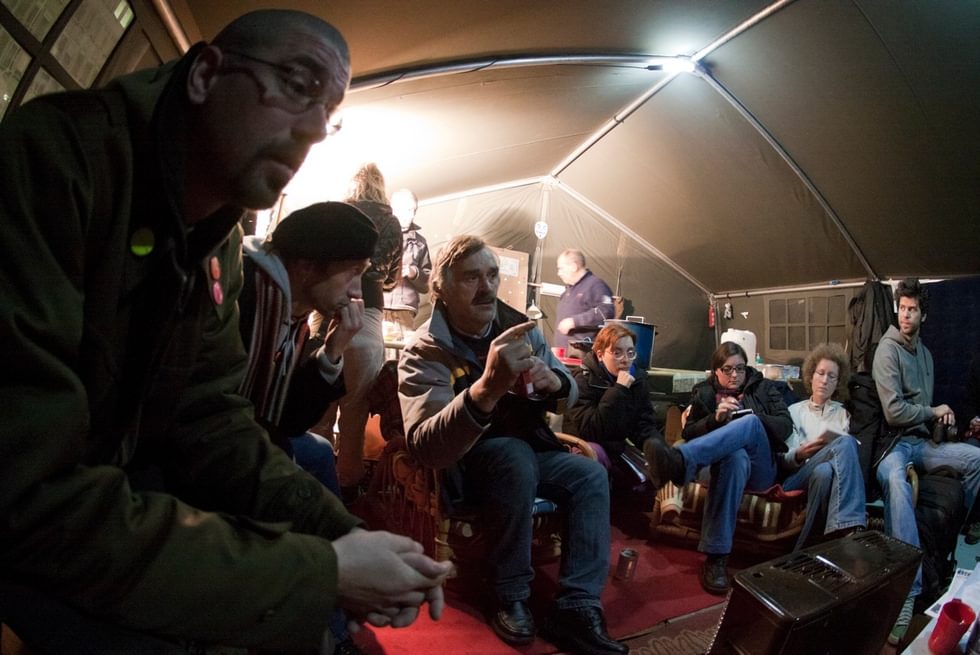Trying to Occupy Harvard
From the Series: Occupy, Anthropology, and the 2011 Global Uprisings
From the Series: Occupy, Anthropology, and the 2011 Global Uprisings

“Occupy Harvard Protest: Valid ID Required.” So read the headline of one of manyarticles published shortly after a group of students and staff set up their tents in Harvard Yard on November 9, 2011. The action culminated in an evening “General Assembly” that attracted some five hundred supporters and was interrupted by Harvard police who forced the (symbolic) gates of the (symbolic) Yard shut on the crowd. In a sense, this was the beginning—and the beginning of the end. Over the following weeks, Occupy Harvard’s participants dwindled from the hundreds of occupiers who were present that first night to a few dozen University affiliates who were permitted to enter the Yard. Anyone who did not possess an official ID, including students at the Harvard Extension School, was shut out of the occupation. As time went by, those of us who were sleeping outside in tents, staffing the info-desk, or facilitating assemblies found ourselves fighting an uphill battle, continually forced to respond to a single question: Why are the gates still closed?
For some, this provided an ideal opening to criticize the University’s out-of-proportion response to a peaceful demonstration, which was viewed as indicative of its general attitude toward the outside world. For many undergraduate participants, however, the damage was done and they gravitated toward other progressive movements. Unaware of disciplinary power’s psychological and rhetorical tactics, many Harvard undergrads seemed to unconditionally blame the occupiers for the inconvenience of having to show their Harvard ID cards whenever they wanted to enter the main campus. Another critique voiced by more progressive undergrads was the lack of a unifying "issue." Rather than take aim at a single concern, Occupy Harvard, like Occupy Wall Street, leveled its critique at larger systemic issues, including the role of the university within hegemonic political and economic structures. A particular tension arose between a number of graduate student occupiers and undergraduate members of a student group working on issues of labor solidarity, eventually leading to the almost complete withdrawal of the latter.
Since the beginning of Occupy Wall Street, much has been made of its prefigurative politics—an increasingly popular mode of political organization and practice among grassroots movements of the Left over the past half-century that models the kind of democratic society in which they aspire to live. In my experience, however, such radical lifestyle politics are more likely to appeal to activists outside of traditional political groupings such as labor unions or specific issue and policy-oriented organizations. Given these dynamics, although it may seem surprising and even counter-intuitive, a little over a month after Occupy Harvard began its core participants were nearly all graduate students.
Why was this so? Harvard PhD students and teaching assistants are not members of a union; for the most part, we do not suffer from the relative precariousness of our colleagues at other institutions. Still, our degree of social alienation as subsidiary members of a major research institution should not be underestimated. From questioning the complicity of academic practice and discourse with prevailing structures of power to concerns about the corporatization of education, it became obvious to many of us that our collective concerns were unlikely to be resolved by the likes of Harvard Counseling Services or our academic advisors.
During the last few months, several Occupy Harvard participants have debated the goals and strategies of the wider Occupy movements and have developed a concern with how the issues addressed by Occupy play out in our own pre-professional lives. While participation and enthusiasm in General Assemblies has waned, a result of disinterest, lack of commitment, and the exigencies of academic timetables, many of us have continued to participate in Occupy Harvard through the organization of a “dis/conference” and weekly “think tanks” on “The Future of Libraries” and “Power, Coercion and the University,” among other topics. It is not clear how much longer a group of people recognizable as “Occupy Harvard” will continue to exist. What is clear is that the past six months have provided an opportunity to critically examine how our institutional affiliations and academic practices intersect with larger structures of power and inequality.
As graduate students we have drawn on our identity as individuals from diverse disciplines and backgrounds while collectively attempting to confront and deconstruct the veneer of institutional authority. The nature of academic life with its emphasis on individual intellectual pursuits has led me to consider that in some ways the response to social and institutional pressures a number of us criticized in undergraduates may also structure our own priorities. It is perhaps time to consider how the radical experiment in collective thinking and organization fostered by Occupy might influence not only the content, but also the form of our scholarship and pedagogy beyond other models frequently advanced by the radical Left. Within the pretence of a liberal arts education, it seems likely that many undergraduates would not sense the problems of entrenched intellectual and social hierarchies in given disciplines as acutely as their graduate peers. In the future, an alternative approach might allow us to find common ground and to deepen our engagement with our undergraduate comrades, both in and outside the classroom.
Philip Cartelli is a doctoral candidate in Social Anthropology with Media at Harvard University. His research explores the intersections of memory and space in the city of Marseille.